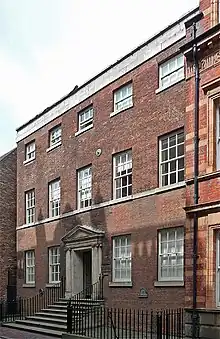Joseph Page (architect)
Joseph Page (c. 1718 - 23 April 1776) was an architect based in Kingston upon Hull.[1][2]

Maisters House, High Street, Hull 1743-44

Blaydes House, High Street, Hull 1759

Prince Street, Hull, 1771
Life
He was born in Barton-on-Humber, the son of a bricklayer Francis Page and his wife Elizabeth. He was baptised in St Peter's Church, Barton-upon-Humber on 26 Feb 1718.
He was apprenticed to a Hull bricklayer in 1733 and completed his apprenticeship in 1740. He became one of the leading architects and master builders of Georgian Hull.[2]
He died on 23 April 1776 and was buried in St Peter's Churchyard, Barton-upon-Humber. On his gravestone is the epitaph architect and master builder, of an extensive genius in the liberal arts superior to many and excell’d by few.[3]
Works
- Maisters House, 160 High Street, Hull 1743-44[4]
- Etherington House 1750 (demolished 1947)
- Blaydes House, Hugh Street, Hull 1759
- 9-12 King Street, Hull 1771
- 3, 6-12 Prince Street, Hull 1771[5]
- Trinity House Guild Room, Hull 1775[6]
References
- Colvin, Howard (1995) [1954]. A Biographical Dictionary of British Architects, 1600–1840 (3rd ed.). New Haven: Yale University Press. p. 720. ISBN 9780300060911.
- Neave, David; Neave, Susan (2010). Pevsner Architectural Guides. Hull. Yale University Press. p. 11. ISBN 9780300141726.
- Neave, David; Pevsner, Nikolaus (1995). The Buildings of England. Yorkshire. York and the East Riding. Yale University Press. p. 501. ISBN 9780300095937.
- Historic England, "Maisters House (1283090)", National Heritage List for England, retrieved 23 July 2023
- Historic England, "No. 3, Prince Street and Nos. 6-12, Prince Street (1197680)", National Heritage List for England, retrieved 23 July 2023
- Historic England, "Hull Trinity House (1219563)", National Heritage List for England, retrieved 23 July 2023
This article is issued from Wikipedia. The text is licensed under Creative Commons - Attribution - Sharealike. Additional terms may apply for the media files.